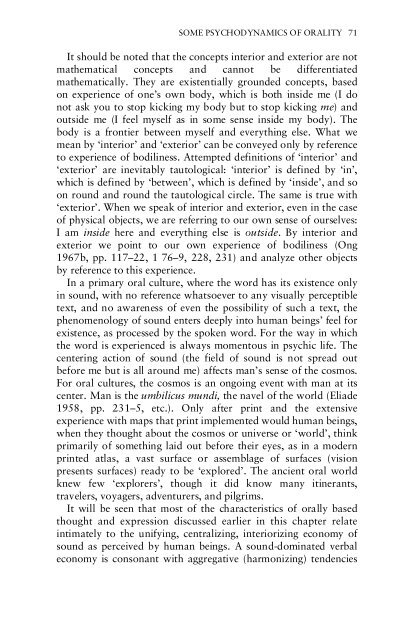Orality and Literacy: The Technologizing of the Word - Monoskop
Orality and Literacy: The Technologizing of the Word - Monoskop
Orality and Literacy: The Technologizing of the Word - Monoskop
You also want an ePaper? Increase the reach of your titles
YUMPU automatically turns print PDFs into web optimized ePapers that Google loves.
SOME PSYCHODYNAMICS OF ORALITY 71<br />
It should be noted that <strong>the</strong> concepts interior <strong>and</strong> exterior are not<br />
ma<strong>the</strong>matical concepts <strong>and</strong> cannot be differentiated<br />
ma<strong>the</strong>matically. <strong>The</strong>y are existentially grounded concepts, based<br />
on experience <strong>of</strong> one’s own body, which is both inside me (I do<br />
not ask you to stop kicking my body but to stop kicking me) <strong>and</strong><br />
outside me (I feel myself as in some sense inside my body). <strong>The</strong><br />
body is a frontier between myself <strong>and</strong> everything else. What we<br />
mean by ‘interior’ <strong>and</strong> ‘exterior’ can be conveyed only by reference<br />
to experience <strong>of</strong> bodiliness. Attempted definitions <strong>of</strong> ‘interior’ <strong>and</strong><br />
‘exterior’ are inevitably tautological: ‘interior’ is defined by ‘in’,<br />
which is defined by ‘between’, which is defined by ‘inside’, <strong>and</strong> so<br />
on round <strong>and</strong> round <strong>the</strong> tautological circle. <strong>The</strong> same is true with<br />
‘exterior’. When we speak <strong>of</strong> interior <strong>and</strong> exterior, even in <strong>the</strong> case<br />
<strong>of</strong> physical objects, we are referring to our own sense <strong>of</strong> ourselves:<br />
I am inside here <strong>and</strong> everything else is outside. By interior <strong>and</strong><br />
exterior we point to our own experience <strong>of</strong> bodiliness (Ong<br />
1967b, pp. 117–22, 1 76–9, 228, 231) <strong>and</strong> analyze o<strong>the</strong>r objects<br />
by reference to this experience.<br />
In a primary oral culture, where <strong>the</strong> word has its existence only<br />
in sound, with no reference whatsoever to any visually perceptible<br />
text, <strong>and</strong> no awareness <strong>of</strong> even <strong>the</strong> possibility <strong>of</strong> such a text, <strong>the</strong><br />
phenomenology <strong>of</strong> sound enters deeply into human beings’ feel for<br />
existence, as processed by <strong>the</strong> spoken word. For <strong>the</strong> way in which<br />
<strong>the</strong> word is experienced is always momentous in psychic life. <strong>The</strong><br />
centering action <strong>of</strong> sound (<strong>the</strong> field <strong>of</strong> sound is not spread out<br />
before me but is all around me) affects man’s sense <strong>of</strong> <strong>the</strong> cosmos.<br />
For oral cultures, <strong>the</strong> cosmos is an ongoing event with man at its<br />
center. Man is <strong>the</strong> umbilicus mundi, <strong>the</strong> navel <strong>of</strong> <strong>the</strong> world (Eliade<br />
1958, pp. 231–5, etc.). Only after print <strong>and</strong> <strong>the</strong> extensive<br />
experience with maps that print implemented would human beings,<br />
when <strong>the</strong>y thought about <strong>the</strong> cosmos or universe or ‘world’, think<br />
primarily <strong>of</strong> something laid out before <strong>the</strong>ir eyes, as in a modern<br />
printed atlas, a vast surface or assemblage <strong>of</strong> surfaces (vision<br />
presents surfaces) ready to be ‘explored’. <strong>The</strong> ancient oral world<br />
knew few ‘explorers’, though it did know many itinerants,<br />
travelers, voyagers, adventurers, <strong>and</strong> pilgrims.<br />
It will be seen that most <strong>of</strong> <strong>the</strong> characteristics <strong>of</strong> orally based<br />
thought <strong>and</strong> expression discussed earlier in this chapter relate<br />
intimately to <strong>the</strong> unifying, centralizing, interiorizing economy <strong>of</strong><br />
sound as perceived by human beings. A sound-dominated verbal<br />
economy is consonant with aggregative (harmonizing) tendencies

















